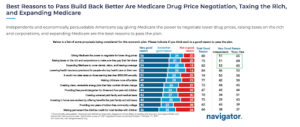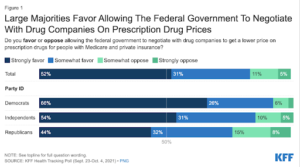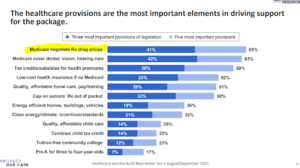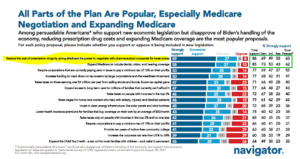Recent Polling Confirms Drug Pricing Remains Voters’ Top Concern As Congress Finalizes the Build Back Better Act
Yesterday, Democrats announced a framework for the Build Back Better Act. While the historic agreement will dramatically lower health costs and expand care, it is missing a key plan: giving Medicare the power to negotiate lower prescription drug prices. As Big Pharma and their allies in Congress continue to fight against reform, Democratic leaders are working to ensure meaningful Medicare negotiation is included in the Build Back Better Act. Poll after poll shows that the #1 element of President Biden’s Build Back Better agenda is Medicare negotiation. Failure to include negotiation in Build Back Better means maintaining the broken system that lets drug companies dictate outrageous prices while millions of Americans struggle to afford their medications.
Giving Medicare the full power to negotiate for lower prices is not just the right thing to do — it’s the smart thing to do. Democrats ran and won on health care in 2018 and 2020. It’s plain and simple: This is not the time to cower to Big Pharma’s demands — Medicare negotiation must remain in the final Build Back Better Act to lower drug prices for all Americans.
RECENT POLLING
Navigator Poll Finds Medicare Price Negotiation As The Best Reason Among Voters To Support Build Back Better. “Independents and economically persuadable Americans say giving Medicare the power to negotiate lower drug prices [is] the best reason to pass the plan.” [Navigator, 10/15/21]

Kaiser Family Foundation Poll Finds Strong Support For Negotiation Across Political Spectrum. “Of those in support: “83% total, 95% of Democrats, 82% of independents, and 71% of Republicans.” [Kaiser Family Foundation, 10/12/21]
- Americans Favor Arguments For Prescription Drug Price Negotiation Than Those Made Against It. “One-third of the public say the argument from those opposed to drug price negotiations is convincing compared to a large majority (84%) who say they found the argument from those in favor convincing.” [Kaiser Family Foundation, 10/12/21]

CBS Poll Finds Overwhelming Support For Build Back Better Health Provisions, With Drug Price Negotiations At The Top. “88 percent of respondents support federal drug price negotiations, with 84 percent in support of expanding Medicare to include dental, vision, and hearing coverage.” [CBS, 10/10/21]

Build Back Together Survey Across 48 Battleground Congressional Districts Finds Allowing Medicare To Negotiate Drug Prices Is The Most Popular Component Of The Build Back Better Plan. “Allowing Medicare to negotiate lower prices was the most popular of the 16 components of the Build Back Better plan tested. Over two-thirds of battleground district voters (71%) say this component makes them more likely to support the reconciliation plan. It is especially popular with seniors, but also the most popular component among both independents and those voters who are persuadable on the reconciliation plan.” [ALG Research, 9/29/21]
Hart Research Poll Finds Hart Medicare Negotiation Was The Most Important Element In Driving Support For The Build Back Better Package. “When making the case for the Build Back Better Act, it’s significantly strengthened by including health care. Support for the investments in critical priorities in the act is strong (74-26%) but is significantly stronger (80-20%) when the description includes that the plan reduces health care costs and the price of prescription drugs.” [Hart Research, 9/13/21]

NAVIGATOR Polls Finds Economically Persuadable Americans Want Prescription Drug Negotiation. “86 percent of respondents support reducing the cost of prescription drugs by giving Medicare the power to negotiate with pharmaceutical companies for lower prices, with 69 percent of Democrats, 49 of independents, 50 percent of Republicans, and 63 percent of economically persuadable Americans strongly supporting the measure.” [NAVIGATOR, 9/8/21]


